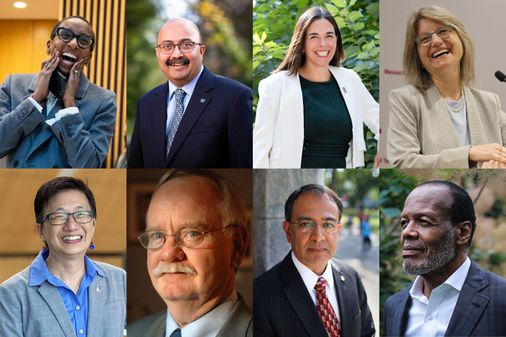Higher education institutions in the New England region have witnessed sweeping leadership changes in 2022.
This extraordinary regional pattern mirrors a national exodus of college presidents who led their schools through the height of the COVID-19 pandemic. Here’s a roundup of some of the most prominent changes in leadership at colleges and universities in New England throughout the year.
Massachusetts Institute of Technology
Former Duke University provost and cell biologist Sally Kornbluth was selected as MIT’s next leader Oct. 20. As MIT’s second female president, Kornbluth, 61, said she hopes to empower and uplift faculty and staff. Kornbluth will assume her role as president Jan. 1, 2023.
Kornbluth takes over from President L. Rafael Reif, who announced his resignation Feb. 10. after more than 10 years in the position. Throughout his presidency, Reif navigated the pandemic, remained a staunch advocate for diversity on campus, and weathered controversy surrounding the university’s relationship with sex offender Jeffrey Epstein.
Boston University
After almost two decades in the role, President Robert Brown announced plans in September to step down from the role at the end of the academic year. Brown intended to remain president until 2025, but said it felt like the right time to leave. After a sabbatical, Brown will return to the university’s College of Engineering to continue teaching.
Boston University’s Presidential Search Committee has yet to find the university’s next leader.
Tufts University
In November, Tufts named Sunil Kumar as the university’s next president. Kumar, originally from India, served as Johns Hopkins’s provost and vice president of student affairs, and is now Tufts’s first president of color in its 170-year history. In past leadership roles, Kumar valued diversity, equity, and inclusion, and said he hopes to further embrace those values to make Tufts more accessible to students of all socioeconomic backgrounds.
Kumar succeeds Tufts President Anthony Monaco, 63, who in February announced his plans to retire after 12 years in the role. In collaboration with the Broad Institute, Monaco played a crucial role in the development of COVID-19 testing that facilitated the return of in-person learning. Tufts made strides in the areas of climate change, health disparities, civic engagement, and mental health during Monaco’s presidency, he told the Globe.
Emerson College
Erin Clark/Globe Staff
President Lee Pelton left his leadership role at Emerson in June 2021 to become the CEO of local nonprofit leader The Boston Foundation, according to a WGBH report. During Pelton’s time as Emerson’s first Black president, he advocated for diversity and the support of minority-owned businesses.
Interim president William Gilligan will remain in the role until June 2023.
University of Massachusetts Lowell
Julie Chen was appointed as UMass Lowell’s next chancellor in May. Chen, 57, served as the school’s vice chancellor of research, innovation, and economic development, and she was also a mechanical engineering professor. Chen is known as one of New England’s top experts in nanotechnology, earning her the nickname “nanoqueen.” Chen is the second woman to lead UMass Lowell, and the first openly gay leader in the UMass system.
Chen comes after Jacquie Moloney stepped down from the role this June. During her time as chancellor, Moloney launched the school’s first comprehensive fundraising campaign, which ultimately raised $165 million.
Harvard University
Claudine Gay will be the next president of the Harvard community, the university announced Dec. 15, becoming the first Black person to lead the university. Her selection comes at a time when the institution is reckoning with its historical ties to racism and slavery. Gay, 52, has experience in leadership as the Edgerley Family Dean of Harvard’s Faculty of Arts and Sciences, where she advocated for greater student access to resources, and guided a diverse body of faculty through the pandemic, according to a Harvard Gazette report.
Gay’s appointment comes after President Lawrence Bacow announced he will step down from the position in June 2023, marking an end to his five years in the role. Bacow previously served as Tufts president, and was at the helm of Harvard during the Trump administration and during the pandemic. During his time as president, Bacow, 71, championed affirmative action, and was dedicated to deconstructing Harvard’s ivory tower by forming positive connections with historically Black colleges and universities and international students.
University of Massachusetts Amherst
UMass Amherst chancellor Kumble Subbaswamy announced plans to step down from the role at the end of June 2023, after more than a decade in the position. Subbaswamy helped Massachusetts’s flagship university increase graduation rates, conduct meaningful research, and attract a diverse student body. During his last year in the role, Subbaswamy told the Globe he would focus on sustainability, diversity, equity, and inclusion efforts.
UMass Amherst launched a search for the campus’s next leader in July. They have yet to fill the role.
Dartmouth College
Sian Leah Beilock, 46, will step up as Dartmouth College’s president next summer, becoming the first woman in the role at the ivy-league institution. Beilock previously served as executive vice provost at the University of Chicago, and president of Barnard College.
The move comes after President Philip Hanlon, 67, announced plans to resign in June 2023. Hanlon was president since 2013. Hanlon sought to make Dartmouth a magnet for the best and brightest students and one of the nation’s leading research institutions, according to Dartmouth’s website.
Katie Mogg can be reached at katie.mogg@globe.com. Follow her on twitter @j0urnalistkatie




